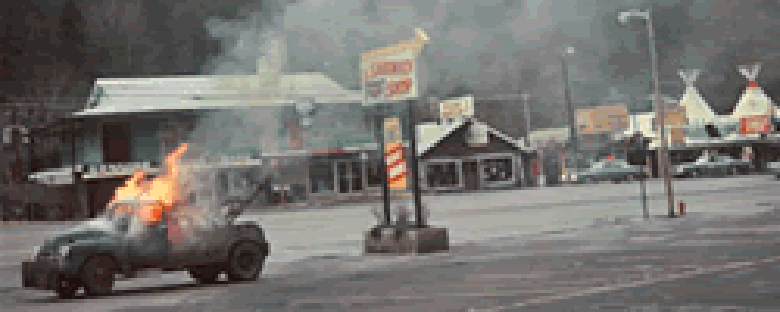Reviews
Werner Herzog
Germany, 1977
Credits
Review by Rumsey Taylor
Posted on 11 July 2004
Source Anchor Bay Entertainment DVD
Related articles
Features: The Enigma of Bruno S.
Features: Directors: Werner Herzog
Stroszek opens with a man’s (Bruno S., here, as Bruno Stroszek) release from prison. He is threatened readmission if he drinks, exits, and immediately enters a bar. Inside is Eva, prostitute and friend, engaged in an argument with her pimp. Bruno consoles her and offers his shelter.
At home the two are joined by a neighbor Mr. Scheitz — a strange and feeble old man with a mad fascination with science. The three are bound by a unique camaraderie, and they plan to move to Wisconson in pursuit of American freedom.
The film is seemingly a study of the polarization of American Midwest culture and German lower class. Herzog’s gaze is neither of condescension nor appraisal as each scenario befits the trio with temporary comforts and larger, impending discomforts.
Stroszek’s sociological standpoint is obvious and is obscured (perhaps deliberately) by the main characters. Bruno, Eva, and Mr. Scheitz (a convict, prostitute and old man) are no denotative measures for a larger society. The grouping, as well as its singular members, is too atypical in spite of their typical aims. Ultimately Stroszek favors its characters and their strife instead of the larger socio-political struggle at play.
Enlarging his presence in The Enigma of Kaspar Hauser, the history of Bruno S. is infused in his character. Later in the film, he even addresses an episode from his youth in which he was publicly humiliated for urinating in bed.
The first half of the film is in a slightly impoverished, working-class Germany. The trio has aspirations for which their country serves no opportunities. They are enticed by “The American Dream” without considering what their exodus will entail.
In Railroad Flats Bruno becomes a mechanic, Eva a waitress (Mr. Scheitz engages in very odd experiments, testing his weird theory of “animal magnetism”). Their dream is fulfilled with the lease of a new mobile home and television. This renewed purpose temporarily satisfies their goals, though things happen that deteriorate their pact — the reasons for which are persistently unknown.
Minus Eva (she flees with a pair of truckers to Vancouver), Bruno and Mr. Scheitz have their mobile home repossessed. Armed with a shotgun and convinced that the Americans have formed a conspiracy against them, the two set to rob a bank. The targeted bank is closed. Logically, they rob the barbershop beside it.
The final sequence is a hallmark of metaphoric ambiguity, as well as a legend in film endings. Police officers arrive at a scene of chaos at a Cherokee, North Carolina tourist arcade: a driverless truck is on fire and turning in circles, a man is aboard a chairlift, and an animal arcade is activated. No further description is necessary beyond the final line in the film: “We can’t stop the dancing chicken. Send an electrician.”
We don’t do comments anymore, but you may contact us here or find us on Twitter or Facebook.



